The Measurement, Learning & Evaluation (MLE) Project’s Baseline Survey Report for the Senegal Urban Health Initiative (ISSU), conducted in the cities of Dakar, Guédiawaye, Pikine, Mbao, Mbour and Kaolack, documented that over 85% of women had spontaneous knowledge of a modern family planning (FP) method and that almost all women (over 97%) were aware of at least one contraceptive method after being prompted. However, only 34% of all women and 52% of women in union reported using a modern FP method.
What is Limiting the Use of Modern FP Methods?
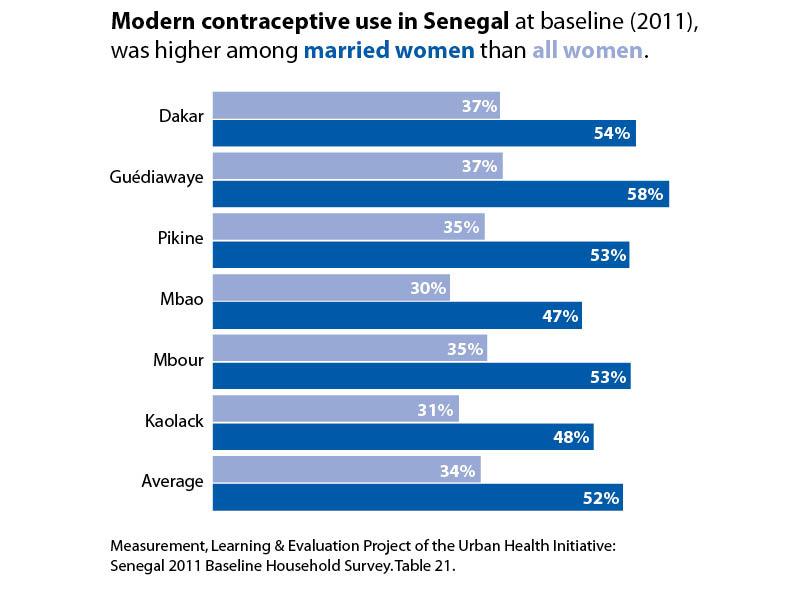
The percentage of women using a modern family planning (FP) method in all six urban areas surveyed in Senegal.
Certain beliefs, myths and misconceptions that likely deter women and men from using FP methods are widespread throughout Senegal. During the household survey conducted by MLE, all women and men who were aware of at least one contraceptive method were asked whether they totally agreed, agreed, disagreed, or strongly disagreed with several beliefs. Large percentages of women subscribed to the inaccurate assertions. For example, nearly seven in ten women (67%) and more than six in ten women (61%) in Mbao believe that people who use contraceptives ultimately have health problems and that contraceptives are hazardous to health. According to more than four in ten women (42%), contraceptives can damage the uterus, while 40% believe that getting a contraceptive injection makes women permanently sterile.
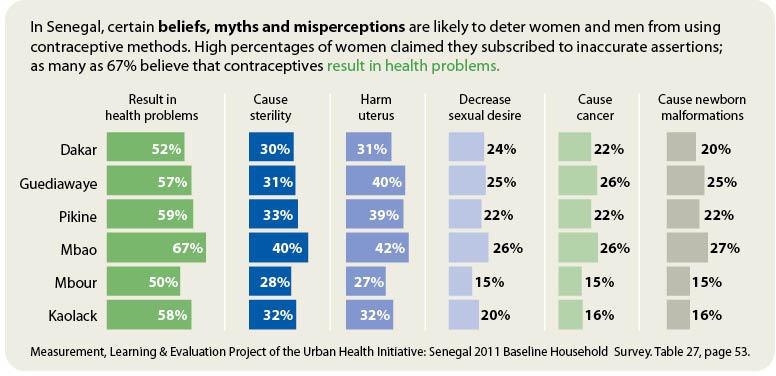
Distribution (%) of women agreeing or completely agreeing with the following arguments regarding the use of FP among those who know FP methods.
Other reasons mentioned by women for not using FP methods include religious beliefs and opposition by others. Gender norms influence FP use; the final decision about contraception is most often made by the husband. The baseline household survey found that, across all six sites, more than two in three women stated that they needed the consent of their partner or family before they could use a FP method.
During the household survey, the women who were aware of at least one FP method but who were not using a FP method at the time of the interview were asked for the main reasons why they were not currently using a method. The reasons were classified into five relatively similar categories. The barriers to use included: 1) reasons related to fertility; 2) opposition to FP use; 3) lack of knowledge; 4) reasons related to the FP method; and 5) religious reasons. In all sites, the most cited reason was the absence of sexual intercourse or low sexual intercourse frequency (56%-57% in Dakar and Guédiawaye; 49%-50% in Mbour, Mbao, Pikine, and Kaolack). While the percentages are low by comparison to these two main reasons, fear of health problems and side effects from FP methods, as well as the husband’s objection and religious regions were cited across all cities.
Addressing the Barriers: ISSU’s Televised Debates
Television is the most accessed medium in major urban areas in Senegal; on average, over 90% of the population sampled at baseline watched television at least once a week. Television was also found to be an important source of FP information for the population. For example, in Dakar, 58% of women and 78% of men stated that television was their major source of information on FP.
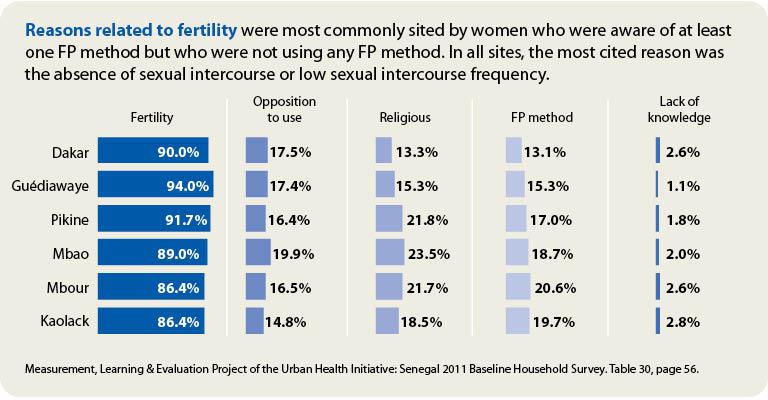
Distribution (%) of women based on their reasons for not using FP methods among those who know at least one method.
To address the barriers to FP use, ISSU organized three televised debates involving community and religious leaders (Ratib Imams) as well as medical personnel. Their purpose was to increase communication on and information about FP. The ISSU team designed the debates to focus on key issues that affect the acceptance and continued use of FP methods. The debates aired on nationally-broadcasted television stations and were targeted to the general population — particularly married women and their husbands.
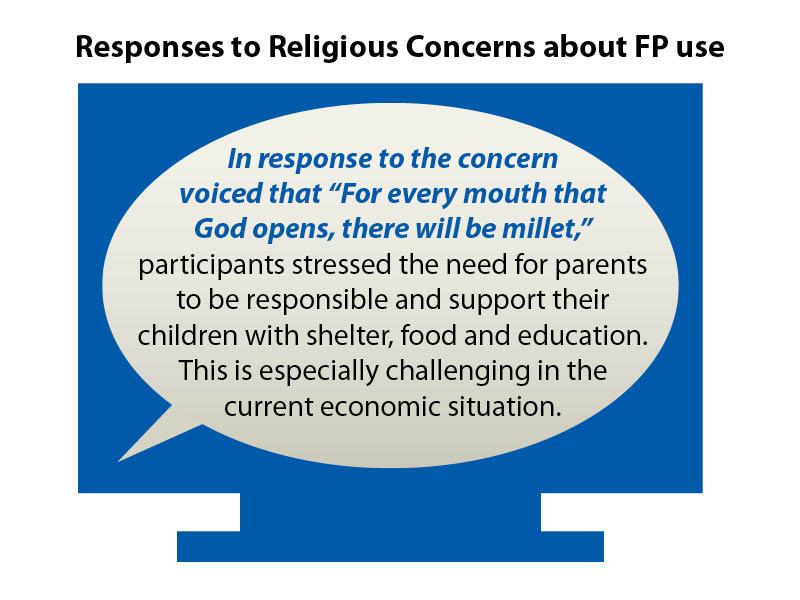
The Senegalese Urban Reproductive Health Initiative (ISSU) engaged religious leaders to promote use of family planning (FP) methods.
The debate format was selected based on a national communication plan that was developed and included three main objectives: 1) strengthen messages regarding FP and religion; 2) strengthen strategies to involve men in FP messaging; and 3) improve messages regarding side effects and rumors surrounding FP. The broadcasts each lasted between an hour and an hour and a half. They were broadcast after the evening newscasts, considered “prime time” in Senegal, and were rebroadcast during the morning and afternoon. After each debate, viewers were invited to submit comments online. The debates were also posted on YouTube; one debate conducted in 2014 has been viewed almost 2,000 times.
Topics were chosen to counter common misperceptions and to increase social acceptance of FP.
The three televised debates focused on a diverse range of issues affecting FP use, including Islamic teachings about FP, socio-cultural determinants and the merits of FP as a strategy to reduce maternal and infant mortality. The topics were chosen to counter common misperceptions and to increase social acceptance of FP. To respond to the misconception that Islam forbids FP, debate participants cited sections of the Quran that support FP use. To address socio-cultural determinants that decrease use of FP methods, such as side effects and lack of partner support, debate participants stated that contraceptive side effects are manageable and temporary and that husbands must ensure the health as well as the economic stability of their entire family.
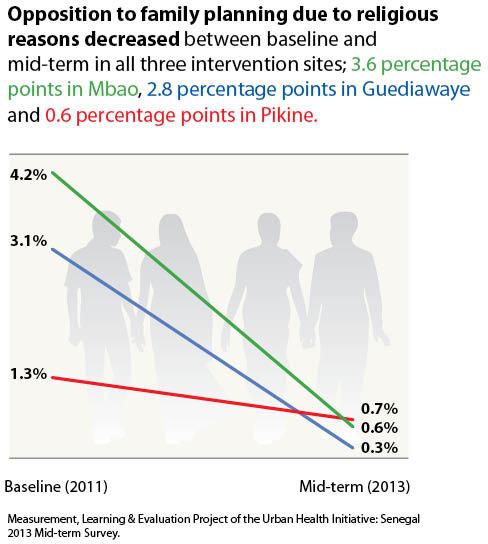
Distribution (%) of women not using FP and who know at least one method of contraception according to the reasons for non-use of a FP method, by site, at baseline and mid-term.
Results of the Televised Debates
The debates exposed the Senegalese population to important health and socio-cultural messages about FP. They have contributed to the gradual shift in attitudes about and use of FP in Senegal by providing the public with informed responses addressing common socio-cultural barriers by trusted members of society. According to the MLE mid-term evaluation conducted in 2013, there has been a significant decrease in the percentage of women citing religious reasons as barriers for the use of any FP method. There has also been an increase in the percentage of women using modern FP methods between the baseline and the mid-term evaluations. The televised debates may have contributed to this increase.
This story was originally written by the Measurement, Learning & Evaluation Project, which evaluated the Urban Reproductive Health Initiatives (UHRIs) in Kenya, Senegal, Nigeria and India. The Challenge Initiative is charged with expanding access to the proven solutions and successes developed under the UHRIs.


